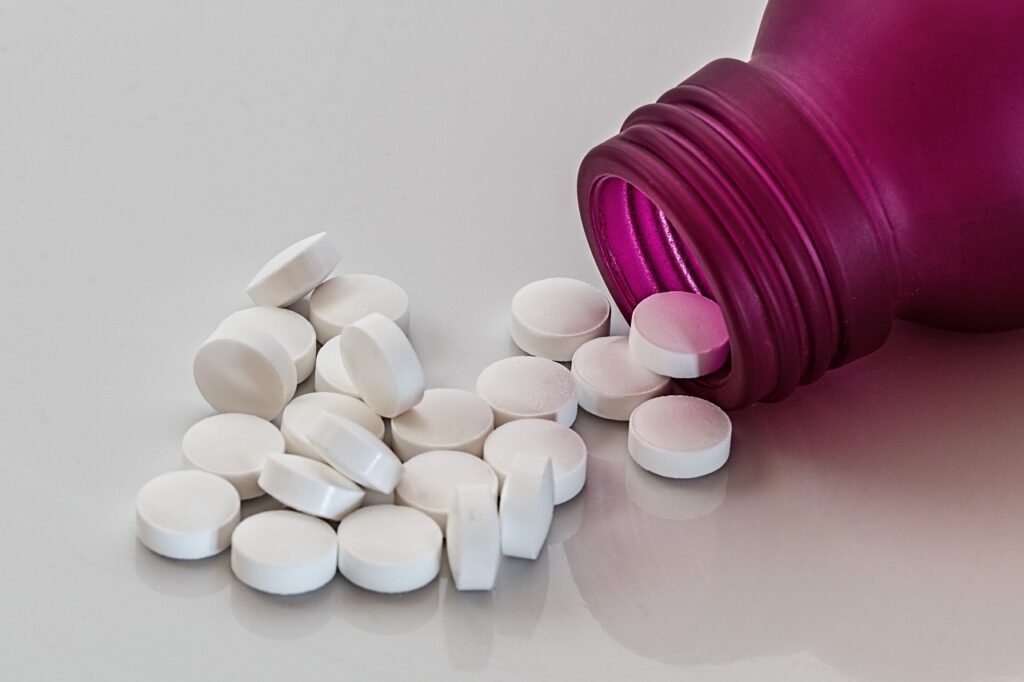20+ Years Experience
Specialist Inpatient Rehabilitiation

Imagine a world where some of the most commonly prescribed medications designed to help end up causing harm. This is the reality of prescription drug addiction.
It’s a growing epidemic, with millions of people falling prey to the allure of these seemingly innocuous medications.
It’s time to shine a light on this often-overlooked issue and uncover the truth about prescription drug addiction.
From the risks and causes to prevention strategies and treatment methods, let’s dive into the complex world of prescription drug addiction and see how we can make a difference.
As we explore the depths of this problem, we’ll uncover the most commonly abused prescription drugs, the signs and symptoms to look out for, and the various factors contributing to their addiction.
You’ll learn about the medical consequences of prescription drug addiction, including the impact on health, social, and legal aspects of life.
We’ll also discuss the different treatments available to help those struggling with addiction, as well as prevention strategies to curb the issue at its core.
Prescription drug addiction is a hidden enemy lurking in plain sight.
Opioids, stimulants, and sedatives are the most commonly abused prescription drugs, responsible for countless addictions and overdoses worldwide.
But why are these medications so attractive? The answer lies in their ability to interfere with our brain’s composition, which in turn alters its functioning.
This interference can lead to substance abuse, causing users to rely on these drugs to cope with everyday life after prolonged use.
Prescription drug addiction has become a significant public health and law enforcement problem worldwide in the past decade.
Despite this, it has brought with it medical and social consequences.
With such alarming statistics and consequences, it’s crucial to understand the scope of prescription drug addiction and the various types of drugs that contribute to this growing problem.
Opioid painkillers, such as prescription painkillers, are the most frequently misused form of prescription opioids.
These drugs are prescribed to provide pain relief but can have a dark side, as they can induce a mild euphoric feeling.
The addictive nature of opioids is further exacerbated by the growth in opioid prescriptions due to factors such as an increase in those living with chronic pain.
The consequences of opioid addiction can be dire, with respiratory difficulties and even mortality resulting from opioid overdoses.
As the opioid crisis continues to plague society, it’s essential to recognise the dangers associated with opioid painkillers and their role in prescription drug addiction.
Prescription stimulants, including amphetamines (Adderall, Dexedrine) and methylphenidate (Ritalin, Concerta), are typically prescribed for conditions like attention-deficit hyperactivity disorder (ADHD).
These medications, classified as Schedule II drugs, are associated with serious risks if not used appropriately.
With their stimulating effects, they possess considerable potential for abuse and addiction, leading to physical and psychological dependence if misused.
The improper use fo these drugs can result in severe health risks and other negative consequences, such as:
It is crucial to use prescription medications responsibly and only as prescribed by a physician to avoid falling into the trap of addiction and its potentially devastating consequences.
Sedatives and anti-anxiety medications encompass a wide range of drugs, including CNS depressants, sleeping pills, and benzodiazepines.
These medications are designed to reduce brain activity and treat conditions such as insomnia, seizures, and anxiety.
However, their misuse can lead to addiction, with the production of GABA potentially inducing an addictive feeling.
The abuse of sedatives and anti-anxiety medications can be highly addictive, and recognising an addiction early is vital in addressing the problem.
Being aware of the risks associated with these medications and using them only as prescribed is crucial in preventing addiction and ensuring the well-being of those who rely on them for treatment.
Recognising the signs and symptoms of prescription drug abuse is a critical step in addressing the problem before it spirals into addiction.
Indicators of prescription drug abuse may vary depending on the type of drug but can include:
Being aware of these signs can help friends and family members intervene early and potentially save a loved one from the devastating consequences of addiction.
Understanding the various signs of prescription drug abuse can also enable individuals to self-reflect on their own behaviour and habits.
By being honest with oneself and seeking help when needed, one can take control of their life and combat the dangerous cycle of addiction.
Behavioural changes can be an early warning sign of prescription drug abuse. Some possible indications of a problem include:
Recognising these changes in oneself or a loved one can provide an opportunity to intervene before addiction takes hold.
The heightened requirement for privacy, in particular, can be indicative of prescription drug abuse, as the individual might be attempting to conceal their drug use from others.
Mood swings and a lack of anger management skills can also signal prescription drug abuse, as the individual may be unable to regulate their emotions and may consequently exhibit aggressive or violent behaviours.
Physical symptoms can be another telling sign of prescription drug addiction. When abuse is present, drowsiness, slurred speech, and impaired coordination may manifest.
These signs can be easily overlooked or mistaken for other health issues, making it all the more vital to remain vigilant and seek help if these symptoms persist.
Sustained symptoms that impede regular life, especially when accompanied by other indications of addiction such as variations in behaviour or emotional and psychological signs, can be indicative of prescription drug addiction or opioid dependence.
Identifying these symptoms early on can lead to timely intervention and a greater chance of successful recovery.
Emotional and psychological signs can also point to prescription drug abuse.
Anxiety, depression, and irritability are common indicators that should not be ignored.
These signs, when coupled with physical and behavioural indications, can paint a clear picture of addiction.
Recognising the emotional and psychological signs of prescription drug abuse is essential in seeking help and addressing the root causes of addiction.
By being aware of any alterations in mood, behaviour, and cognitive functioning, individuals can consult a medical doctor or mental health specialist to get the help they need and regain control of their lives.
Various factors contribute to the development of prescription drug addiction.
Some individuals may be genetically predisposed to dependency, making them more likely to become addicted to prescription drugs or other drugs.
Additionally, addiction can manifest in a matter of weeks or months if the drug is being abused chronically.
Understanding these causes and risk factors is crucial in addressing addiction and preventing its onset.
It’s important to draw a distinction between physical dependence and addiction in prescription drug abuse.
Both may arise from the stimulation of the brain’s reward centre by commonly used prescription drugs.
Recognising the difference between these two states can shed light on the complexity of prescription drug dependence and help individuals better understand the factors that contribute to its development.
Prescription drug addiction carries numerous complications and consequences, affecting various aspects of an individual’s life.
Health risks, social implications, and legal ramifications all come into play when one is caught in the grip of addiction.
These consequences can have a devastating impact on the individual’s life, making it all the more crucial to address the problem and seek help when needed.
By understanding these complications and consequences, individuals can gain a clearer perspective on the severity of prescription drug misuse.
This understanding can serve as a driving force for those struggling with addiction to seek help and work towards a healthier, addiction-free life.
Patients addicted to prescription drugs may experience significant health risks, including:
The potential risks of prescription opioid use disorder are not limited to one’s physical health.
Mental health disorders such as depression, anxiety, and suicidal thoughts have also been linked to prescription drug and opioid addiction.
Those who abuse prescription drugs may suffer from organ damage and cognitive issues.
Liver damage, kidney damage, and cognitive impairment can all result from addiction to prescription medications.
Recognising these health risks and taking steps to address addiction is crucial in mitigating the potentially life-threatening consequences of addiction to prescription drugs.
Prescription drug addiction can lead to a host of social implications, including:
Addiction can strain relationships and make individuals self-centred, further alienating them from their loved ones and support networks.
Effective prevention and treatment strategies are essential in addressing these social implications and helping individuals regain control of their lives.
Legal ramifications are another consequence of addiction to prescription drugs.
Misuse of prescription drugs, as well as illegal or recreational drugs, can result in:
The legal consequences of addiction can serve as a harsh reminder of the severity of the problem and highlight the importance of seeking help and addressing addiction head-on.
Addressing prescription medication addiction requires a multi-faceted approach, including medical detox, therapy, and support groups.
Each of these treatment methods plays a crucial role in helping individuals overcome addiction and work towards a healthier, more fulfilling life free from the grips of prescription drugs (or other drugs).
Understanding the various treatments available is essential in determining the best course of action for individuals struggling with addiction.
By exploring these options and tailoring treatment plans to suit individual needs, those grappling with addiction to prescription medications can take control of their lives and embark on the path to recovery.
Medical detox is a pivotal component of treating prescription drug addiction.
It involves the systematic decrease of the drug in the body which may cause the patient to experience withdrawal symptoms.
This process can be carried out under the supervision of medical professionals, who utilise medications and medical monitoring to manage withdrawal symptoms and ensure the individual’s safety during detoxification.
The role of medically supervised detoxification for treating addiction to prescription medications is to provide individuals with a means of transitioning into further treatment programs.
By safely and effectively withdrawing from drugs or alcohol under medical supervision, individuals can begin the process of recovery and move on to other forms of treatment designed to address the root causes of their addiction.
For more information on our medication-assisted treatment, please complete our enquiry form.
Whether you need help with addiction to over-the-counter drugs, illegal drugs or doctor-prescribed medication, we can help.
We will get back to you with more information on how to prevent opioid misuse and stop prescribed and illicit drug use altogether.
Therapy and counselling are invaluable tools in the treatment of prescription drug use and addiction.
They enable individuals to identify and address the root causes of their addiction, develop healthier coping strategies, and learn how to manage their cravings and triggers.
Cognitive-behavioural therapy, dialectical behaviour therapy, motivational interviewing, and family therapy are some of the types of therapy and counselling available for prescription medication addiction.
The advantages of therapy and counselling for prescription drug use include enhanced self-awareness, improved coping skills, and augmented motivation to remain sober.
By participating in therapy and counselling sessions, individuals can gain a deeper understanding of their addiction and work towards a healthier, happier life.
Those with a physical dependence to prescription drugs may also think about support groups such as Narcotics Anonymous. We would also recommend visiting National Institute on Drug Abuse if you want to learn more.
Support groups and aftercare play a crucial role in maintaining long-term recovery from prescription drug addiction.
They provide individuals in recovery with:
Long-term aftercare is essential for individuals in recovery, as it can prevent relapse and provide sustained support and guidance.
By participating in support groups and aftercare programs, individuals can cultivate healthy coping skills, construct a robust support network, and maintain their commitment to a life free from addiction.
Preventing prescription drug abuse is just as important as treating it.
Implementing proper medication management and providing education on the matter can help prevent prescription drug abuse.
By taking proactive steps to address the issue at its core, we can work towards a future where prescription opioid addiction is no longer a widespread epidemic.
Parents can play a vital role in preventing prescription drug abuse among their adolescents by engaging in dialogue about the risk factors associated with misuse, supervising their activities, and keeping records of their prescriptions.
Education and awareness initiatives can also be tailored to target specific demographics, such as adolescents and college students, who may be particularly prone to prescription drug misuse.
Proper prescription medication management is essential in preventing prescription drug abuse. It entails:
By adhering to these guidelines, individuals can reduce the potential for prescription drug abuse and ensure that medications are used safely and effectively.
Proper medication management is a crucial component of prevention, playing a vital role in keeping individuals and communities safe from the dangers of prescription medication addiction.
Education and awareness are paramount in preventing prescription drug abuse.
By providing information and knowledge concerning the risks and consequences of prescription drug misuse, education programs can assist individuals in making informed decisions and understanding the significance of proper prescription drug use and using medications as prescribed.
Raising awareness through campaigns can help diminish the stigma associated with addiction and motivate individuals to seek assistance if they are dealing with prescription drug abuse.
Focusing education and awareness initiatives on certain demographics, such as adolescents and college students, can also be effective in preventing prescription drug abuse and ensuring the well-being of vulnerable populations.
Prescription drug addiction is when someone develops a dependence on medication, losing their ability to control how much or often they use it and causing serious health issues.
It can happen quickly with certain medications and range from taking a friend’s prescription painkiller to intentionally snorting or injecting ground-up pills for the purpose of getting high.
The most common prescription drugs abused are opioids for pain relief, CNS depressants to treat anxiety or sleep problems, and stimulants for ADHD and other sleep disorders.
Prescription drugs can lead to addiction.
This is because continued use of certain medications can activate the brain’s reward centre, leading to physical dependence and a loss of control over usage.
This can cause an increasingly detrimental impact on one’s health.
Prescription drug addiction can manifest itself in physical and psychological symptoms such as:
These symptoms can be difficult to recognise, as they can be similar to those of other medical conditions.
It is important to be aware of the signs of addiction and to seek help if needed.
Treatment for prescription drug addiction typically involves a combination of medications.
Medical detox, therapy and counselling, support groups and aftercare are all available as treatments for prescription medication addiction.
These treatments can help individuals overcome their addiction and lead a healthier, more productive life.
They can also provide the necessary support to help individuals stay on track and prevent relapse.
Prescription medication addiction is a complex and multifaceted issue that affects millions of people worldwide.
By understanding the scope of the problem, the signs and symptoms, and the causes and risk factors, we can better address this growing epidemic.
With various treatments available, including medical detox, therapy, and support groups, individuals struggling with addiction can find hope and embark on the journey to recovery.
Preventing prescription drug abuse is a crucial component in combating this widespread problem.
Through proper medication management and education and awareness initiatives, we can work together to create a safer and healthier future for everyone.
If you abuse prescription drugs and need help to stop your substance abuse, please speak to our professionals today.
We can help you stop abusing prescription drugs and start a happy and healthy life.
There are a range of other services that we can provide. Have a look at the list below for more information:




















We Aim To Reply To All Enquiries With-in 24-Hours